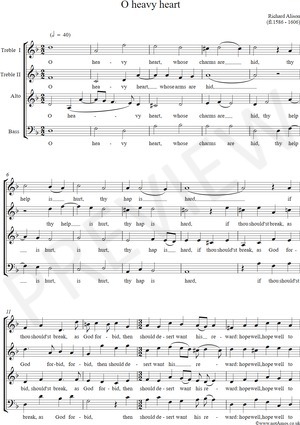 notAmos Performing Editions 1 Lansdown Place East, Bath BA1 5ET, UK +44 (0) 1225 316145 Performing editions of pre‑classical music with full preview/playback and instant download |
Richard Alison
(fl.1586 - 1606)
O heavy heart
(S.S.A.B.)
Full score (PDF), €0.00 for unlimited copies Download this item(fl.1586 - 1606)
O heavy heart
(S.S.A.B.)
Printable cover page (PDF), €0.00 for unlimited copies Download this item
If you have any problem obtaining a PDF, please see our help page. If that does not resolve the issue, please click here.

This work, Alison : O heavy heart : scoreid 148327, as published by notAmos Performing Editions, is licensed under a Creative Commons Attribution-ShareAlike 4.0 International License. All relevant attributions should state its URL as https://www.notamos.co.uk/detail.php?scoreid=148327. Permissions beyond the scope of this licence may be available at https://www.notamos.co.uk/index.php?sheet=about.
| Enquire about this score |
| About Richard Alison |
| Full Catalogue |
| About us | Help, privacy, cookies |
| About Richard Alison |
| Full Catalogue |
| About us | Help, privacy, cookies |
Published in An Howres Recreation in Musicke, London, 1606, and (according to the frontispiece) "framed for the delight of gentlemen and others which are well affected to that quality; all for the most part with two trebles necessary for such as teach in private families".
Lyrics: Anon
O heavy heart, whose charms are hid,
Thy help is hurt, thy hap is hard,
If thou should'st break, as God forbid,
Then should desert want his reward:
Hope well to have, hate not sweet thought,
Foul cruel storms fair calms have brought;
After sharp show'rs the sun shines fair,
Hope comes likewise after despair.
In hope, a king doth go to war;
In hope, a lover lives full long;
In hope, a merchant sails full far;
In hope, just men do suffer wrong;
In hope, the ploughman sows his seed;
Thus hope helps thousands at their need:
Then faint not heart, among the rest,
Whatever chance, hope thou the best.
Though wit bids will to blow retreat,
Will cannot work as wit would wish;
When that the roach doth taste the bait,
Too late to warn the hungry fish;
When cities burn on fiery flame,
Great rivers scarce may quench the same;
If will and fancy be agreed,
Too late for wit to bid take heed.
But yet it seems a foolish drift,
To follow will and leave the wit;
The wanton horse that runs too swift
May well be stay'd upon the bit;
But check a horse amid his race,
And out of doubt you mar his pace.
Though wit and reason doth men teach
Never to climb above their reach.
I can no more but hope, good heart,
For though the worst doth chance to fall,
I know a while shall ease thy smart
And turn to sweet thy sugar'd gall;
When thy good will and painful suit
Hath shak'd the tree and wants the fruit,
Then keep thou patience well in store,
That sovereign salve shall heal thy sore.
O heavy heart, whose charms are hid,
Thy help is hurt, thy hap is hard,
If thou should'st break, as God forbid,
Then should desert want his reward:
Hope well to have, hate not sweet thought,
Foul cruel storms fair calms have brought;
After sharp show'rs the sun shines fair,
Hope comes likewise after despair.
In hope, a king doth go to war;
In hope, a lover lives full long;
In hope, a merchant sails full far;
In hope, just men do suffer wrong;
In hope, the ploughman sows his seed;
Thus hope helps thousands at their need:
Then faint not heart, among the rest,
Whatever chance, hope thou the best.
Though wit bids will to blow retreat,
Will cannot work as wit would wish;
When that the roach doth taste the bait,
Too late to warn the hungry fish;
When cities burn on fiery flame,
Great rivers scarce may quench the same;
If will and fancy be agreed,
Too late for wit to bid take heed.
But yet it seems a foolish drift,
To follow will and leave the wit;
The wanton horse that runs too swift
May well be stay'd upon the bit;
But check a horse amid his race,
And out of doubt you mar his pace.
Though wit and reason doth men teach
Never to climb above their reach.
I can no more but hope, good heart,
For though the worst doth chance to fall,
I know a while shall ease thy smart
And turn to sweet thy sugar'd gall;
When thy good will and painful suit
Hath shak'd the tree and wants the fruit,
Then keep thou patience well in store,
That sovereign salve shall heal thy sore.
